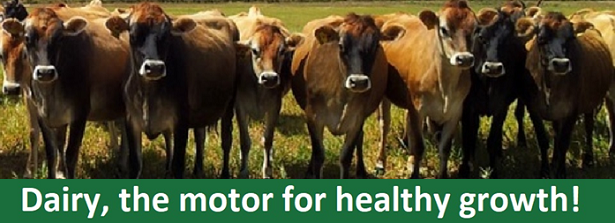Dairy, the motor for healthy growth

The annual African Dairy Conference & Exhibition (AfDa) is the key event for the dairy industry in East Africa. The day before this event, a coalition of NEADAP, AgriProFocus, 3R and F&BKP co-organized a joint knowledge sharing event “Dairy, the motor for healthy growth”. To prepare this meeting they held “Dairy dialogues” in four countries. During the AfDa expo, they invited other Dutch actors to their “Dairy knowledge corner”.
A coalition of NEADAP, AgriProFocus, 3R Kenya and F&BKP co-organized a joint knowledge sharing event on August 13, 2019, called “Dairy, the motor for healthy growth”. Central question discussed during this regional event was: How can we learn and build on our collective knowledge to promote the necessary changes for the dairy sector transformation in East Africa? The event was planned the day before AfDa and was held five years after the publication of the White Gold study on dairy and development in East Africa. The meeting brought together all dairy value chain actors working in East Africa. In the weeks building up to the event, the co-organizers held preparatory “Dairy dialogues” in Addis, Arusha, Kampala and Kigali.
Dairy, the motor for healthy growth
Source: AgriProFocus website
The Chief guest Mr. Dominique Menjo, Economic Adviser, Food Security, Office of the Deputy President noted that Africa is producing less than 5% of the global milk production yet more than 10% of the dairy cattle globally are in Africa. Importing is not developing the sector and there is need for actors to work together to transfer knowledge and innovations to attract investments and become more competitive in the market as well as nurture those small upcoming industries. He further advised that the sector needs to be attractive to the youth as approximately 12,000 agriculture students graduate annually from universities/Technical and vocational Education & Training (TVET).
Ms. Sanne Willems, First Secretary Food Security and Water, Embassy of the Kingdom of Netherlands in Kenya noted that the demand for dairy products is growing and in order to ensure sustainability there is need for compliance of dairy products to food safety standards and safe water for use in hygienic milk production needs to be addressed.
The forum had break-out sessions which focused on four key thematic areas namely: milk quality, forage, inclusive business and dairy skills 2.0.
In the milk quality session, stakeholders discussed about raw milk testing; legislation and enforcement; and the role of each stakeholder in ensuring milk quality. The key outcome in the session was milk quality is money driven hence the need to have multi-stakeholder agreements on standards, regulation, enforcement and consumer awareness. Additionally, for the public to have trust in milk quality it should be secured by good legislation, transparency, instant and clear testing, accurate and user-friendly technologies and incentives for good quality.
A quick scan of the commercial forage sub-sector in Kenya, Uganda and Ethiopia was done by fodder experts from SNV and Wageningen University and Research (WUR) in order to assess interventions and opportunities in the sector. Some of the issues identified include forage quality and quantity; forage preservations and capacity building in terms of animal nutrition. Delegates recommended that there is need to develop, strengthen and expand an internal and external quality based and safe milk market as a driver of quality forage production; develop modular curriculum emphasizing climate smart forage production from “Seed to Feed to Milk”; disseminate to the farmer a full package of requisite practical knowledge and skills; intensify forage production (productivity and quality) as the main driver to improve profitability of dairy farms in a sustainable way; optimize milk production and profitability at farm level through use of quality forages in balanced rations which is considered the best way to reduce the price of raw milk, enhance productivity of dairy cows and enable private sector involvement to create a vibrant and competitive forage sub-sector.
On inclusive business development session, delegates agreed on the importance of effective market linkages with better enforcement of contracts; inclusive innovation; wide-chain collaboration and; fair and transparent governance.
Mr. Andrew Mwaura, Country Coordinator AgriProFocus moderated the session on Dairy Skills 2.0 which aimed to find out the necessary skills for future dairy development in East Africa and jointly identify recommendations for dairy learning in East Africa based on emerging trends.
Actors agreed on the need of having an enabling environment for dairy sector transformation and for it to be achieved there is need for knowledge transfer from research and academia to farmers.
Regional politics; non-compliance to milk quality & safety standards; markets not in favour of small-scale farmers; poor management and governance along the value chain, climate change and lack of efficiency in production are some of the threats that hinder growth in the dairy sector. However, there are also opportunities that need to tapped for instance leveraging on improved dairy technologies, regional trade, increasing demand for safe products and formulating policies that govern issues of liberalization, prices and other factors that affect competitiveness of the dairy sector.
Documents to download |
Follow-up
As a follow-up on the learning event, Netherlands and East African dairy partners shared a booth at the AfDa expo. During the 15th African Dairy Conference & Exhibition (AfDa, August 14-16, 2019, Nairobi) there were 3900 participants with over 100 exhibitors inside and outside the KICC in Nairobi. In their “Dairy knowledge corner” the co-organizers NEADAP, AgriProFocus, 3R and F&BKP invited other Dutch dairy actors, namely SNV, Solidaridad, Wageningen UR, PUM and Van Hall Larenstein University, to present their work, products, training materials, videos and practical research briefs. AgriProFocus held a smartphone survey among visitors to find out about their demand for dairy knowledge.
The co-organizers aim to kick start a Dairy Sector Community; dairy actors who are actively involved at country level, share and learn at East African level. Social media and videos of the “action on the ground” help market the event and the continuation of a Dairy Learning / future group which is rooted in the region.





